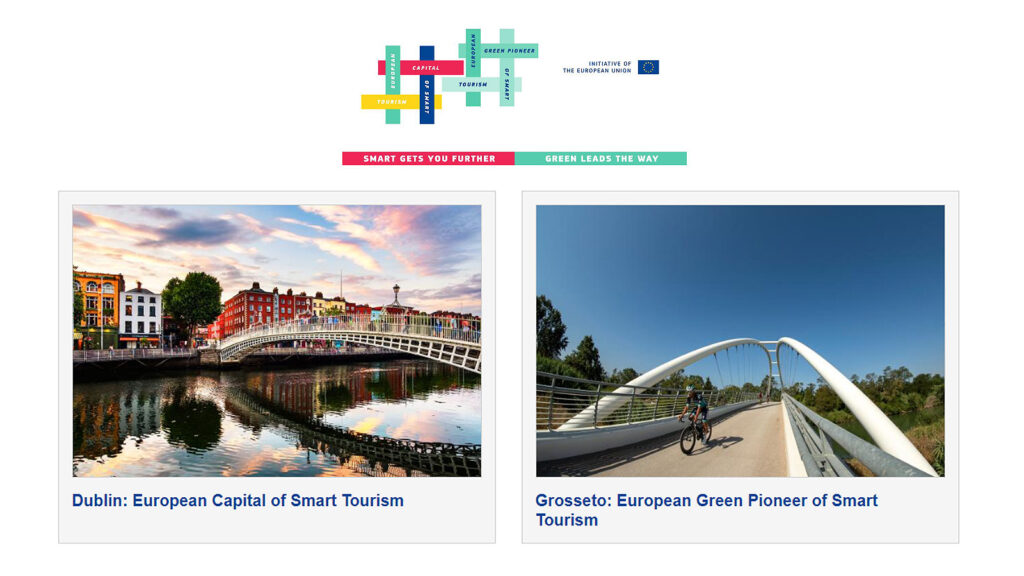This week, the European Commission unveiled a collection of pioneering smart and sustainable tourism practices from cities participating in the 2024 European Capital and Green Pioneer of Smart Tourism competitions.
The European Capital of Smart Tourism award acknowledges cities for excellence in accessibility, sustainability, digitalisation, and cultural heritage. Furthermore, the European Green Pioneer of Smart Tourism, the successor of the European Destinations of Excellence (EDEN) competition, honors smaller destinations for exceptional accomplishments in sustainable tourism and green transition practices.
The recently published reports “Leading examples of Smart Tourism Practices in Europe” present the selection of innovative best practices in each category of the European Capital of Smart Tourism competition (accessibility, sustainability, digitalisation, cultural heritage and creativity) and green transition and sustainable practices of the European Green Pioneer of Smart Tourism competition.
The 2024 European Capital & Green Pioneer of Smart Tourism
Dublin (Ireland), the 2024 European Capital of Smart Tourism, and Grosseto (Italy), the 2024 European Green Pioneer of Smart Tourism, exemplify smart tourism leadership. These destinations showcase successful strategies and measures for advancing sustainable tourism through digital and green transition practices.
Some of the leading practices from the two winners include:
Smart tourism in Dublin (Ireland)
Dublin was one of the first European Cities to set up a dedicated Culture Company to help drive cultural participation in the city. It runs cultural initiatives and buildings across the city with and for, the people of Dublin. By collaborating with communities, cultural organisations, businesses, and Dublin City Council, it embeds cultural experiences and increases cultural participation throughout the city. Dublin strives to make culture accessible to all, with the Dublin After Hours project. It supports the nightlife economy by funding opportunities for museums and galleries to open later into the night. Extending opening hours helps to drive more events within venues, making them more accessible to a much wider audience.
The Irish City sets a high standard for tourism digitalisation with its Dublinked open data platform, boasting over 600 datasets including extensive tourism information on attractions, activities, and accommodation. Leveraging these datasets, the city enhances tourism experiences by incorporating data feeds, such as the locations of activities and attractions, into digital city kiosks, facilitating improved navigation for visitors.
Sustainable tourism in Grosseto (Italy)
The philosophy behind Grosseto’s tourism strategy is the preservation of its nature and traditions. Grosseto’s Regional Park of Maremma is an important protected area used for agro-tourism activities, cultural, archaeological, scientific research, and sustainable tourism projects. To introduce the importance of sustainability to children, the Municipality of Grosseto offers schools outdoor classroom experiences, where children discover the local nature through thematic workshops, guided walking tours, educational games and treasure hunts. Children learn to recognise the botanical species and various birds that populate the wetland while learning about the importance of the area’s natural resources.
The protraction of the tourist season is another crucial concern for the Municipality of Grosseto. To address this, the city has introduced a series of free guided tours known as ‘Raccontare Grosseto’. These tours aim to engage both residents and tourists in exploring the city and its surrounding areas at a leisurely pace, primarily through walking and cycling. Many free guided tours are organised to visit the small villages in the surrounding area, offering tourists to taste the local wines and food.
The article Dublin and Grosseto lead the way in European Smart Tourism – 2024 Best Practice Reports released first appeared in TravelDailyNews International.
